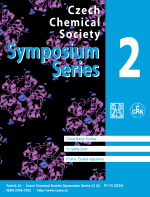Pevná bismutová kapková elektroda – nový nástroj pro voltametrické stanovení elektrochemicky redukovatelných organických sloučenin
DOI:
https://doi.org/10.54779/ccsss20240061Klíčová slova:
metronidazol, antibiotika, analýza léčiv, elektrochemie, diferenční pulzní voltametrie, pevná bismutová kapková elektrodaAbstrakt
Solid bismuth drop electrode (SBiDE) is a new working electrode commercially available on the Czech market from 2020 by the company Metrohm. The aim of this work was to verify the applicability of the SBiDE in the voltammetric determination of a model organic substance. According to the available information, this is the very first published work on this topic. Metronidazole (an antibiotic used to treat diseases caused by both Gram-positive and Gram-negative anaerobic bacteria) was chosen in this study as a model drug representing electrochemically reducible biologically active compounds. Under optimum conditions (Britton-Robinson buffer of pH 12.0 used as the supporting electrolyte and no electrochemical regeneration of the working electrode surface), a linear calibration dependence of metronidazole was recorded in the concentration range from 1 to 600 μmol L–1, with the limits of detection (LOD) and quantification (LOQ) of 0.41 μmol L–1 and 1.4 μmol L–1, respectively. The newly developed differential pulse voltammetric (DPV) method has also been successfully applied in the determination of metronidazole in various dosage forms.




